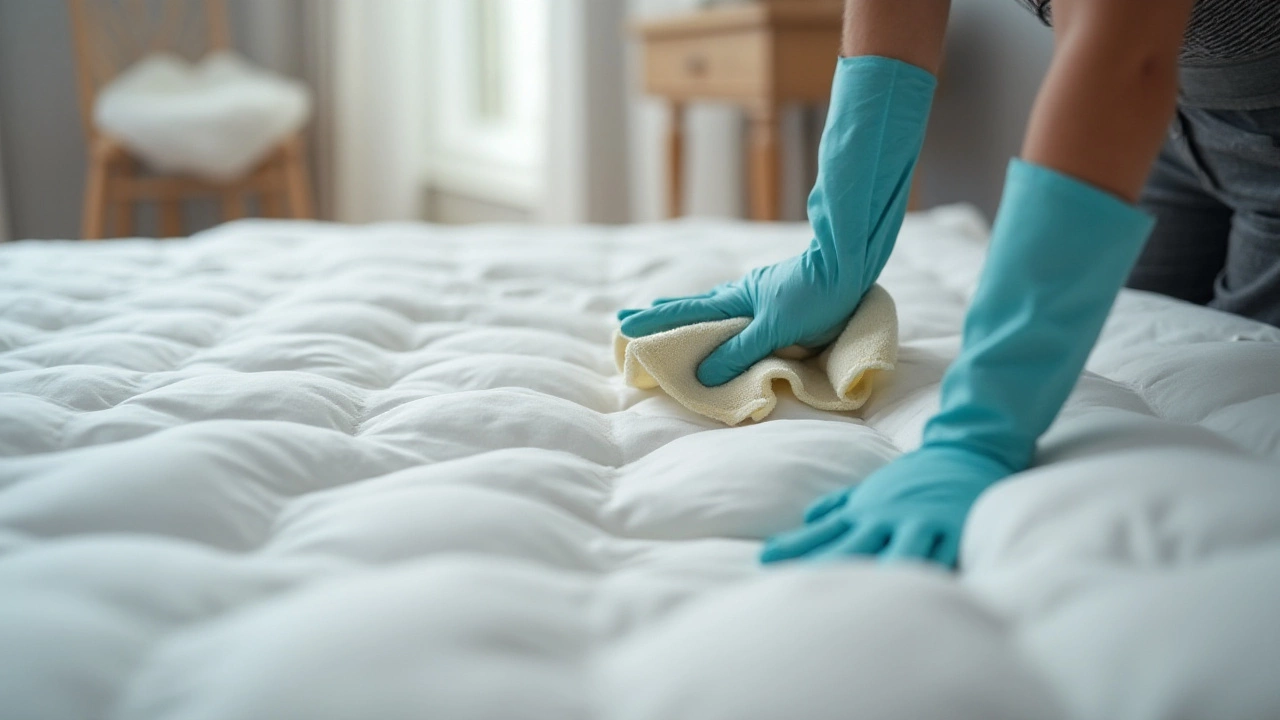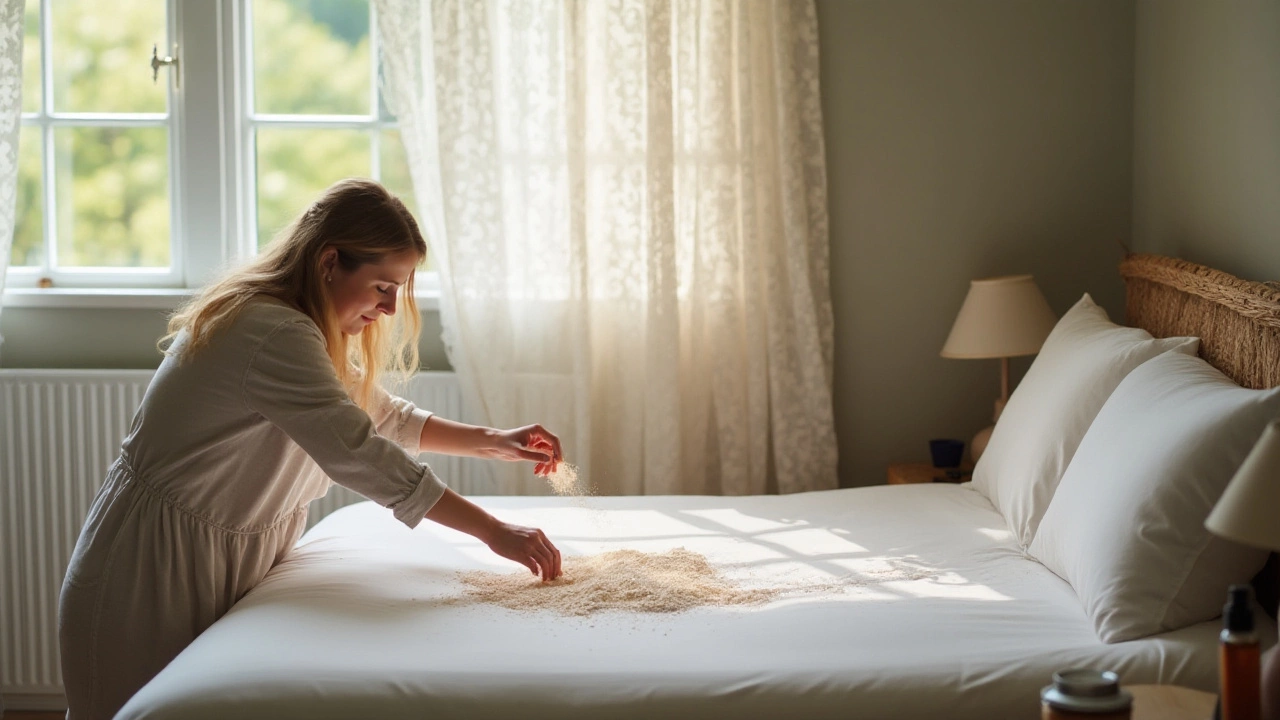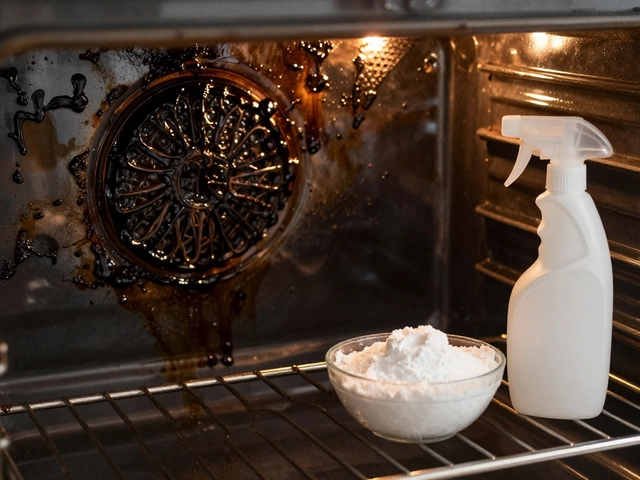If you've ever noticed an unpleasant smell lingering around your bed, you're not alone. Mattresses are notorious for trapping all sorts of odors from spills, sweat, and everyday grime. To ensure a good night's sleep and a fresh bedroom environment, it's important to deep clean your mattress occasionally.
This guide walks you through both simple and comprehensive methods to eliminate odors efficiently. We’ll delve into natural solutions you probably have at home, such as baking soda and essential oils, and offer step-by-step instructions that bring your mattress back to life. Whether you’re battling an old juice spill or just everyday use, say goodbye to bad smells and hello to restful slumber.
- Understanding Why Mattresses Smell
- Preparing for a Deep Clean
- Natural Cleaning Solutions
- Step-by-Step Cleaning Process
- Preventing Future Odors
- When to Seek Professional Help
Understanding Why Mattresses Smell
Imagine you lie down for a good night's rest only to be met with an unpleasant aroma wafting from your bed. It's more common than you think, and the reasons why mattresses develop odors are as varied as they are intriguing. The layers within a mattress can act like a sponge, absorbing everything from the musty scent of a damp room to the potent aroma of a morning coffee spill or even the earthy smell of sweat accumulated over the months. This absorption happens because the fibers and materials in mattresses, like cotton, foam, and even memory foam, have porous qualities that trap moisture and create a breeding ground for bacteria and fungi.
A significant contributor to the issue is human factor—our bodies naturally shed sweat and skin cells, sometimes up to a staggering one pound per year. This blend of moisture and organic material can attract dust mites, which themselves contribute to odors. About half of the weight of a mattress after ten years of use can be from dust mites and their waste, which is a disquieting statistic to many. Consider how night sweats during warmer months or the accidental coffee spill can deeply infiltrate these absorbent layers, letting bacteria thrive in the humid conditions they favor. Over time, this results in odors that are hard to ignore.
Mold growth is another hidden culprit behind smelly mattresses, especially in humid climates or poorly ventilated rooms. The dark, warm, and slightly damp environment of a mattress is ideal for mold to settle, and as it flourishes, it releases a musty odor many are familiar with. Frequent changes in room temperature—like heating in winter and cooling in summer—can exacerbate this as condensation may develop inside the mattress. Interestingly, even pets that share the bed can leave behind distinct scents from their fur and natural oils.
It's not just our activity that contributes to the problem. Environmental factors, like the air quality in your home, play a role too. Pollutants and household allergens can find their way into the mattress fabrics, lingering for extended periods. A study conducted by the National Institute of Environmental Health Sciences found that indoor air quality can affect not just our health but the freshness of household items as well. Over time, without proper care, a mattress starts to reflect these accumulated smells, making regular mattress cleaning a necessity not just for comfort but for health.
"Regular airing and cleaning of beds and bedding can significantly reduce the odor and improve sleep efficiency," advises a report published by Sleep Research Society.
Understanding the reasons behind a smelly mattress is the first step in tackling the issue effectively. It emphasizes the need for habitual maintenance and highlights the significance of choosing materials wisely when purchasing a new bed. Natural fibers tend to breathe better, thereby resisting some odors. Knowledge is power, and knowing why your mattress smells is half the battle won in ensuring your sleep zone remains a serene sanctuary.
Preparing for a Deep Clean
Before diving into the actual process of deep cleaning, it's crucial to set the stage with proper preparation. Start by stripping your bed of all linens, pillows, and mattress covers. Unlike what many believe, even freshly washed covers can harbor dust mites and allergens, so make sure everything is completely removed. This initial step ensures you have a clean slate and can access every inch of the mattress surface. As you do this, consider laundering the bed clothes in hot water, which is effective in killing any hidden bacteria.
Next, take time to gather the necessary cleaning supplies. You'll need a vacuum cleaner with a upholstery attachment, baking soda, a clean cloth, and a gentle dish soap or laundry detergent. For mattress cleaning, baking soda acts as a natural deodorizer, while soap and water help with spot cleaning. It’s also helpful to bring out a soft-bristle brush for scrubbing stubborn stains. Additionally, a couple of essential oils like lavender or tea tree can not only freshen up the smell but provide antimicrobial properties. Lay everything nearby to avoid unnecessary delays during your cleaning process.
Before you begin, it’s wise to assess the fabric and the manufacturer’s guidelines on care instructions. Every mattress comes with a tag that usually specifies suitable cleaning methods. Ignoring this could lead to permanent damage. Also, keep the room well-ventilated throughout the process. Open windows or turn on the fan to help disperse both odors being lifted from the mattress and essential oils that you might apply later. According to the Sleep Foundation, a well-ventilated bedroom improves air quality, which supports a healthier living environment and a more restful sleep.
Proper ventilation is an often overlooked aspect of home care, says Dr. Jane Williams, a prominent home hygiene expert, noting that 'good airflow assists not only in removing cleaning fumes but also in drying out natural oils.'
As you prepare, don’t overlook the opportunity to survey your bedroom for signs of mold or persistent dampness. Sometimes, what seems like a problem related to the mattress itself could be a symptom of underlying issues in the room. For instance, excess moisture can result from poor insulation or insufficient airing. Here's a helpful tip: wiping down walls with a dry towel can help assess moisture levels. If the walls feel damp, you might need to investigate further or bring in a dehumidifier to help combat this. Such proactive measures can be invaluable in preserving the longevity and freshness of both the bedroom and the mattress.

Natural Cleaning Solutions
When it comes to tackling the odors of a smelly mattress, natural cleaning solutions are often your best allies. These household essentials not only neutralize bad smells but also provide a safe environment, something that harsh chemicals often jeopardize. Let's start with the beloved baking soda, a champion in the realm of home cleaning. It's known for its ability to absorb odors effectively. Sprinkle a generous amount onto the mattress, and let it sit for at least 15 minutes, though an hour or two would be better. During this time, the baking soda will work its magic, drawing out moisture and odor-causing bacteria.
While baking soda acts as a foundation, essential oils, such as lavender and tea tree oil, play a complementary role. Add several drops to the baking soda before applying it to the mattress. These oils do more than just deodorize your sleeping space; their antimicrobial properties also contribute to a cleaner sleeping surface, while providing a calming fragrance that promotes sleep. A tip often recommended by many cleaning experts is to create a baking soda-essential oil blend prior to application to ensure even coverage and prolonged effectiveness.
"Baking soda is a tried-and-tested odor eliminator and combining it with essential oils not only enhances the cleaning process but also ensures a pleasant aroma," notes renowned home cleaning expert, Martha Smith.
For those unexpected stains that coincide with odors, white vinegar is another noteworthy remedy. Its acidity can break down the compounds causing the smell. Mix equal parts of vinegar and water in a spray bottle, lightly spritz the affected areas, and let it air dry. Remember, less is more with liquids to avoid moisture buildup. If necessary, multiple applications might be required, but rest assured, vinegar's smell dissipates quickly, leaving freshness behind.
Combining Techniques
For a more thorough clean, consider combining these solutions. First, use the vinegar spray on troublesome spots. Once dry, follow up with a baking soda treatment, this time with your preferred essential oil. Not only does this method double down on odor elimination, but it also makes the mattress smell like a spa. Repeat this routine every three months, and you will maintain not just a fresher mattress but a healthier one, too. According to a 2023 survey, over 60% of people who use natural remedies for mattress cleaning report feeling more rested due to the reduction in allergens and odors. Crafting a cleaning routine can revolutionize your sleep quality over time. As a final tip always let the mattress air out for a couple of hours post-treatment for maximum impact.
Step-by-Step Cleaning Process
Deep cleaning a mattress is not as daunting as it sounds and can effectively remove stubborn smells. To begin, start by stripping all the bedding. This includes sheets, pillowcases, and mattress protectors. It’s best to wash everything according to the manufacturer's instructions to avoid any shrinkage or damage, which can be surprisingly common. Once the bedding is removed, it gives you a blank canvas to work on.
Next, your trusty vacuum cleaner becomes your best friend. With its upholstery attachment, start by vacuuming the top surface of the mattress. Work from the top down, moving in long, overlapping strokes. Don’t rush—this step helps eliminate allergens such as dust mites, dead skin cells, and other particulates. Don’t forget to vacuum the sides as well to ensure nothing is left behind. Thorough vacuuming is essential in preparing your mattress for the next steps.
Using Natural Cleaners
Baking soda is a powerful, natural deodorizer and it's kinder on our planet. After vacuuming, sprinkle a liberal amount of baking soda over the entire surface of the mattress. Ensure it’s spread evenly, as it will penetrate deeply and absorb odors efficiently. Allow the baking soda to sit for at least 15 minutes—though 30 minutes is preferable for tougher smells. The longer baking soda sits, the more odor it can absorb.
While you wait, you can prepare a homemade cleaning solution. Mix a cup of warm water, a teaspoon of mild detergent, and a cup of vinegar in a spray bottle. Lightly mist this solution over the mattress, focusing on areas with visible stains or lingering odors. Never oversaturate, as excess moisture can lead to mold growth, which can worsen the problem. Let it rest for another 10 minutes. This solution uses vinegar’s natural antibacterial properties alongside being an effective odor neutralizer.
Giving It Time
Giving your mattress enough time is crucial when it comes to deep cleaning. Patience ensures that the cleaning agents have ample opportunity to work their magic. During this period, make use of this time by washing your bedding and pillows. A fresh cover paired with a clean mattress is a perfect combination for a restful ambience. Waiting also gives you a moment to think about what could have caused unusual odors. Identifying root causes helps prevent them in the future.
The National Sleep Foundation states, “The buildup of dust and odors can affect sleep quality, making regular cleaning an essential part of mattress maintenance.”
Final Steps
Once sufficient time has passed, vacuum the mattress again, this time removing the baking soda. The process is akin to vacuuming the surface at the start but with some noteworthy differences. The baking soda binds itself to particles and odors, and this final vacuum removes it all. You'll notice a marked difference not only in odor but in the mattress's freshness and hygiene. To finish, consider using a fabric-safe effervescent spray for an extra touch of cleanliness without adding moisture.
Once finished, let the mattress air out for a couple more hours. Natural drying is important to ensure there’s no dampness left, which might attract potential allergens. A clean mattress isn't just about comfort; it significantly contributes to your health and sleep quality. And voila, your once smelly mattress is now fresh, ready for a new set of sheets and an excellent night’s rest.

Preventing Future Odors
Preserving your mattress' freshness is more than just an occasional task; it's about integrating a few simple habits into your routine. One straightforward approach is to invest in a quality mattress protector. These protectors form a barrier between your bed and spills or sweat, significantly reducing the risk of odors seeping into the fabric. Plus, they are easily washable, making them an ideal first line of defense against potential smells.
Regular airing out is another effective strategy. Every few months, consider taking your mattress outside for a day. The fresh air and sunlight can do wonders to naturally deodorize and sanitize the fabric. Sunlight is uniquely effective at killing bacteria and breaking down odor-causing compounds. If moving the mattress outdoors isn’t feasible, simply pulling back the sheets and letting natural light and air circulate can still be beneficial.
Keeping the sleep environment clean also contributes greatly to preventing odors. This means regularly laundering bed linens and pillowcases to avoid sweat and body oils accumulating on the mattress surface. Ideally, sheets should be washed every week, with pillowcases refreshed more frequently if needed. This frequent cleaning schedule helps in minimizing residues that could otherwise seep into the fabric.
An often overlooked tip is to vacuum the mattress at least once a month. Using the upholstery attachment, you can remove dust, dead skin cells, and other particles that attract dust mites, notorious for causing can foul odors over time. For an extra fresh effect, sprinkle a light layer of baking soda over the mattress before vacuuming. Let it sit for at least 15 minutes to absorb any lingering smells and moisture.
"Regular maintenance is key to prolonging your mattress's lifespan and keeping it free from unwanted smells," says interior hygiene expert Laura Sands. "It doesn’t take much time and can significantly improve your sleep environment."
Finally, be mindful of your bedroom's humidity levels. Excessive moisture in the air can encourage mold and mildew, both of which emit distinct odors and can pose health risks. Consider using a dehumidifier if your room tends to hold moisture, particularly in humid climates.
To encapsulate, following these preemptive measures helps ensure your mattress remains a haven of freshness. These tips are simple, yet exceptionally powerful in preventing deep cleaning sessions in the future, maintaining your peace of mind and mattress hygiene.
When to Seek Professional Help
Sometimes, the task of restoring your mattress to a fresh, odor-free state might go beyond the capabilities of DIY methods. For instance, if after multiple attempts with home remedies, the smell persists or worsens, it could indicate a deeper issue. Significant stains or odors caused by pet urine, heavy mold, or mildew infections, often necessitate the intervention of professionals who have both the expertise and equipment to tackle the problem effectively. Moreover, regular household tools may not penetrate deeply enough to mitigate these issues entirely, risking the structure and integrity of the mattress itself.
Professional cleaning services utilize industrial-grade cleaners that are specifically designed to deal with a wide array of stubborn odors and stains. Their methods may include steam cleaning, which uses high-pressure steam to eliminate the microorganisms that cause odors, or ultraviolet treatments that can effectively remove allergens. Another indicator for seeking professional help is recurring health issues such as allergies or respiratory problems among household members, which can often be exacerbated by a mattress that harbors dust mites or other allergens. Additionally, they might use ultra-violet light to pinpoint hidden stains or areas where bacteria are more concentrated.
If you notice unusual markings or a persistent musty smell despite your best cleaning efforts, this may signal mold growth within the layers of your mattress — an issue that certainly warrants professional attention. Mold not only contributes to odors but also poses significant health risks, and professionals have the means to safely and thoroughly remove it. Many cleaning experts offer services that specifically target biological contaminants — a common source of resilient mattress odors. According to Sleep Foundation, "Professional mattress cleaning techniques are not only thorough but also extend the lifespan of your mattress by removing dirt and odorous oils that may degrade materials over time."
The American Academy of Allergy Asthma & Immunology highlights the fact that 'approximately 20 million Americans suffer from dust mite allergies.' Professional cleaning can drastically reduce these allergens in your mattress.
Ultimately, while home methods can be highly effective for routine maintenance or minor issues, any persistent odor, deep stains, or health-related concerns should lead you to consider hiring a professional. This ensures your mattress cleaning endeavor doesn’t become a recurring nightmare but rather, a one-time solution that leaves your sleeping area freshened and rejuvenated, safeguarding your health and comfort in the process.





